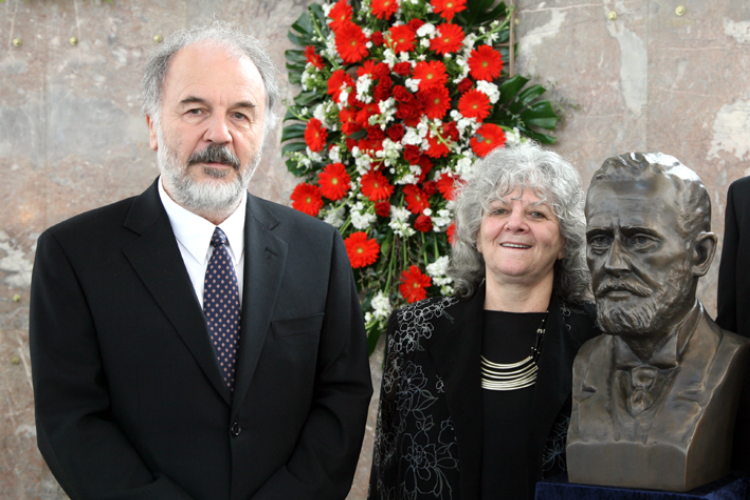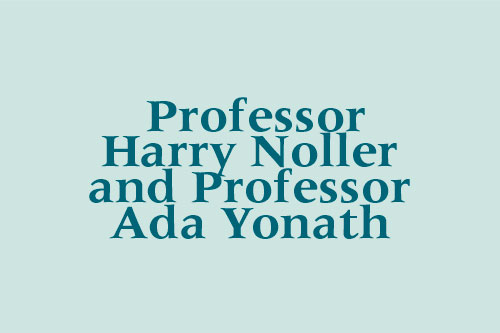- GU Home
- Paul Ehrlich Foundation
- Main Prize
- Preisträger 2007
Prize Winners of the Paul Ehrlich and Ludwig Darmstaedter Prize 2007


Ribosomes close up
For years now, ribosomes have been at the centre of extensive bio-chemical, bio-physical and genetic research activities because they have essential importance for life: they are the cell organelles where protein bio-synthesis takes place. Ribosomes consist of proteins and various RNA components and comprise two sub-units – a large one and a small one. Like a factory, they receive genetically encoded production plans in the form of messenger RNA from the cell nucleus, and then bind amino acid with amino acid according to these plans in such a way that viable proteins are produced. If the work of the ribosomes is impeded, the cell dies. An understanding of protein bio-synthesis therefore has key importance for decoding life and for understanding how sicknesses develop.
Ada Yonath together with Professor Heinz-Günther Wittmann from Max Planck Institute for Molecular Genetics in Berlin pioneered ribosomal crystallography 27 years ago. In cooperation with the Fritz Haber Institute of the Max Planck Society in Berlin they succeeded in characterization of the crystals of the large ribosomal particles by means of electromicroscopical methods for the first time in 1980. They focused on functional complexes of both the large and the small ribosomal subunits of ribosomes from eubacteria that can serve as pathogen models at various phases of protein bio-synthesis. In 2000-2001 Yonath, in collaboration with the team at the Max Planck Institute for Molecular Genetics in Berlin, determined the exact three-dimensional structure and architecture of the small and the large subunits and their complexes with ribosomal antibiotics and other factors, using X-ray crystallographic methods. This gave new insights into the catalytic process and the protein exit tunnel in the ribosomes leading to the formation of viable proteins. Harry Noller and his team were the first research group worldwide to decode the complete structure of a ribosome of the bacteria Thermus thermophilus. Subsequent work revealed details of how a ribosome translocates genetic information in the form of messenger RNA into the synthesis of proteins. Method For their research work, Ada Yonath and Harry Noller used X-ray crystallography, where crystals of the material under investigation are exposed to highly intensive X-ray beams. On the basis of the resulting diffraction pattern, the scientists were able to draw conclusions about the exact structure of the crystal. The ribosome is an unstable, gigantic RNA-protein complex which is difficult to crystallize and which typically, in comparison to other biological material, such as viruses, does not have the inner symmetry or repetitions that make it easier to understand a structure. Introducing of innovative crystallographic techniques, Yonath and Wittmann grew the first ribosomal crystals. However, as these crystals proved to be too sensitive for an analysis with the X-ray beam, Ada Yonath introduced and established the cryo-crystallography method, namely measurements at temperatures of minus 185 degrees Centigrade, and consequently succeeded in overcoming this challenge. Yonath and her team used "heavy atom clusters" as markings, which stand out of the ribosomal electron density map owing to their high electron density. These markings allow the exact determination of the positions of certain functional units inside the ribosome. The resulting picture allows a more exact insight into the microscopic world of the ribosome by highlighting particularly conspicuous features. A better understanding of the way in which ribosomal protein bio-synthesis functions could lead to the development of a new generation of antibiotics capable of attacking bacteria at the ribosome level.
Short biography of Ada Yonath
Prof. Dr. Ada Yonath was born in Jerusalem on June 22, 1939, studied chemistry and bio-chemistry at the Hebrew University in that city, and received her doctorate in 1968 at the Weizmann Institute of Science in Rehovot, Israel. After spells in the U.S.A., she returned to the Weizmann Institute of Science in 1970, where she built Israel's first laboratory for protein crystallography, which became world-famous through the X-ray crystal structure investigations of ribosomes. At the end of 1979 she established a collaboration with the Max Planck Institute for Molecular Genetics in Berlin, which lasted until 2004, and from 1986 until 2004, she was also, in addition to her activity at the Weizmann Institute of Science, head of the research unit for molecular biology at the Max Planck Institute on the DESY (German electron synchrotron) in Hamburg. She has received numerous awards for her work, among them the first European Crystallography Prize in 2000, the Israel Prize (in 2002), the Harvey Prize (in 2002), the Massry Foundation International Award and Medal for Ribosome Research (in 2004, jointly with Harry Noller), the Luiza Horwitz Prize (in 2005), the EMET Prize (in 2006), the Rothschild Prize for Life Sciences (in 2006), and the Wolf Award in Chemistry (in 2007). She is a member of the National Academy of Sciences in the U.S.A., the Israeli Academy of Sciences and Humanities, the European Academy of Sciences and member of the European Molecular Biology Organization (EMBO). She is also joint editor of various scientific journals, including the EMBO Journal.
Short biography of Harry Noller
Prof. Dr. Harry Noller was born on June 10, 1939 in Oakland, California. He studied bio-chemistry at the University of California in Berkeley, U.S.A, taking his doctorate in chemistry at the University of Oregon, U.S.A. After research spells in England and Switzerland, he returned to the U.S.A., where he has worked since 1968 at the University of California in Santa Cruz. There, Noller heads the Center for Molecular Biology of RNA. Noller has already received several awards for his work in the field of RNA and ribosome research, including the Massry Foundation International Award and Medal for Ribosome Research in 2004 (jointly with Ada Yonath), the Lifetime Achievement Award of the RNA Society in 2003 and the Newcomb Cleveland Prize of the American Association for the Advancement of Science in 2002. He is a member of various scientific bodies, including the National Academy of Sciences since 1992.

CONTACT
Office Paul Ehrlich Foundation:
Friends of the Goethe University Frankfurt
Goethe-Universität Frankfurt
Campus Westend, PA-Gebäude
Theodor-W.-Adorno-Platz 1
60629 Frankfurt am Main
www.vff.uni-frankfurt.de
Managing Directors
Nike von Wersebe
Tel: 069 / 798 12234
Fax: 069 / 798 763 12234
wersebe@vff.uni-frankfurt.de
Julia Lange
Tel: 069 / 798 12452
Fax: 069 / 798 763 12452
E-Mail: lange@vff.uni-frankfurt.de
Adviser for Members & Foundations
Tina Faber
Tel: 069 / 798 17237
Fax: 069 / 798 763 17237
faber@vff.uni-frankfurt.de
Marketing
Constanze von Plato
Tel: 069 / 798 17237
Fax: 069 / 798 763 17237
vonplato@vff.uni-frankfurt.de
Science Communication
Joachim Pietzsch
Tel: 069 36007188
j.pietzsch@wissenswort.com
Bank Account
Paul Ehrlich-Stiftung
Deutsche Bank AG
IBAN: DE38500700100700083900
BIC: DEUTDEFFXXX
Donations are tax deductible.
- Studying at Goethe University
- International applicants
- Faculties
- Overview of study programmes
- Programme for refugees
- GRADE
- Goethe Business School (continuing education)
- Research at Goethe University
- Scientific news
- Goethe Welcome Center (for international researchers)
- Collaborative research projects
- Individual research
- Visiting fellowships
- Endowed chairs
- About the University
- News-in-brief
- University administration
- Campus locations
- Campus life
- University archives (German)
- Rhine-Main-Universities







